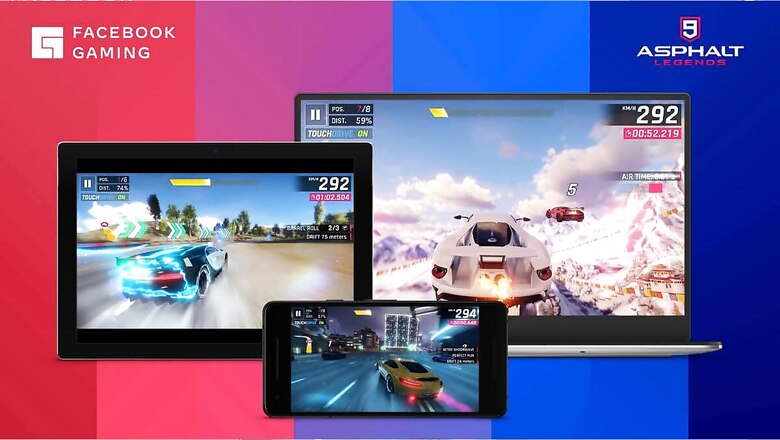
views
Social media giant Facebook has well and truly arrived in the world of cloud gaming platforms and has made its intentions quite clear about taking on Google and Amazon. Unlike Google Stadia and Amazon Luna, the biggest advantage Facebook Gaming will have is that it isn’t a standalone app, but adds cloud gaming to the existing Facebook app. And it is free, while Stadia and Luna are subscription based. Facebook Gaming is available in some regions of the US at this time. While Facebook Gaming is free to play, Google Stadia is priced at $9.99 per month while Amazon Luna, which is up for early access for gamers at this time, is expected to be priced at $5.99 for the Luna+ subscription. The cloud playable games are launching on the Facebook app on Android and also on the web at this time, while Facebook says they are working on alternative options for Apple iPhone users.
Facebook Gaming not being available for Apple devices including the iPhone and the iPad simply follows on from strict App Store guidelines that Apple has. And we have seen this before with Google Stadia and Microsoft xCloud cloud gaming services as well. In fact, the latter had stopped testing the iOS app for xCloud much before the service rolled out on Android on September 15. Apple App Store policies have a problem with the way the cloud gaming services work—a user pays a subscription for the service and the service then lets you access and play games on the cloud, with no game data being saved on your device.
This is where Apple’s policies kick in. There is no way for the App Store to know what content these services allow you to access, whether you are making any further in-app purchases of which Apple doesn’t get a commission even though it is being done on an Apple device, there can be no App Store rating for content and Apple also doesn’t have any control over the quality of content.
“Our customers enjoy great apps and games from millions of developers, and gaming services can absolutely launch on the App Store as long as they follow the same set of guidelines applicable to all developers, including submitting games individually for review, and appearing in charts and search. In addition to the App Store, developers can choose to reach all iPhone and iPad users over the web through Safari and other browsers on the App Store,” Apple had said in an official statement earlier this summer. The important thing to note here is that Apple refers to “submitting games individually for review”. The way cloud gaming platforms work, the games stay within their individual cocoons. Be it Facebook Gaming, be it Google Stadia or be it Microsoft xCloud. And therefore, there cannot be an App Store rating system for users to refer to and neither is there any control over what the top charts show.
“Of course, there is always the open Internet,” so mobile browsers may wind up being an option, but there are limitations to what we can offer on Safari. While our iOS path is uncertain, one thing is clear. Apple treats games differently and continues to exert control over a very precious resource,” says Jason Rubin, VP of Play, Facebook. At this time, Facebook Gaming has rolled out with cloud games that include Asphalt 9: Legends by Gameloft, Mobile Legends: Adventure by Moonton, PGA TOUR Golf Shootout by Concrete Software Inc., Solitaire: Arthur’s Tale by Qublix Games and WWE SuperCard by 2K Games. More games are coming soon.
The thing is, cloud gaming platforms will have to find a way to trade the rigidity for something more flexible, if they wish to access the billions of Apple devices. As of January this year, Apple has already clocked more than 1.5 billion active devices globally. In August, during the quarterly earnings call, Apple also mentioned, “the record business results drove our active installed base of devices to an all-time high in all of our geographic segments and all major product categories.” That’s a big demographic of potential users that Facebook, Google and Microsoft will eventually want to reach out to. It will need a change in the way the respective apps behave on Apple devices, including in-app purchases. But it may just be worth more than arguing about the 30% commission that Apple charges for transactions. Mind you, Google may expect all the same things if the Apple Arcade cloud gaming platform arrives on Android devices.
Read all the Latest News and Breaking News here













Comments
0 comment